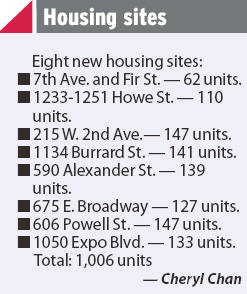Cheryl Chan
Province

Mark Townsend, of the PHS Community Services Society, stands on the site of a future social-housing project at 590 Alexander St. in Vancouver on Tuesday. Ric Ernst — PNG

More than 1,000 new homes for Vancouver’s homeless are about to become reality after the province announced dollars are finally in place to build permanent supportive housing at eight city-owned sites.
The majority of the $225-million cost for the long-awaited projects will be paid for by the provincial government, which is shelling out $205 million — financed mostly by the sale and redevelopment of Little Mountain housing. The rest will be raised by the Streetohome Foundation from the private sector, while the city donated land worth about $32 million.
“These housing units are critically important as we break the cycle of homelessness,” said Premier Gordon Campbell at the official unveiling Tuesday at the Downtown Eastside’s Smith-Yuen building.
“They create a sense of stability for the people who live in them, and they give us an opportunity to connect services that are so essential to them as they deal with their challenges.”
Permanent supportive housing is “absolutely essential” in solving Vancouver’s homelessness crisis, said Mayor Gregor Robertson, who campaigned on a promise to end homelessness by 2015. “We’re seeing a dramatic investment here,” he said. “It’s one that has been long-awaited and certainly most welcome.”
Tuesday’s funding announcement is the culmination of the 2007 memorandum of understanding between the city and province, which laid out 12 sites slated for new social-housing development. Two more sites were added later.
Construction was originally scheduled to start at the end of 2008, but it wasn’t until last year that digging started on six sites.
Construction on the eight remaining sites, which are scattered across the downtown, Fairview and Mount Pleasant, is expected to start this year and take 18 months to complete.
The first two projects to get the green light — 7th and Fir and Howe Street — are kick-started by a $5-million gift from Vancouver philanthropist Frank Giustra, who sits on the Streetohome board.
The two buildings will provide 172 new units and are expected to be completed by early 2012.
In total, the 14 sites will provide 1,575 new homes for people. But more are needed. According to Streetohome’s 10 Year Plan, 2,000 units will be needed over the next 10 years to solve Vancouver’s homelessness problem.
“We are committed to finding new resources to help bridge the housing gap in Vancouver,” said Streetohome chairman John McLernon, adding the foundation is committed to raising $26.5-million from private and corporate donors toward housing projects as well as homelessness prevention and education.
Wendy Pedersen of the Carnegie Community Action Project welcomed the announcement but said it’s nowhere near enough.
“It’s only one quarter of what we need, according to the city’s own homeless action plan,” said Pedersen on the sidewalk outside the Smith-Yuen building. “It’s good to build this housing, but people need to understand the province should be stepping up and building a lot more.”
Pedersen was also wary of funding from the Streetohome Foundation, arguing housing should not be dependent on charitable donations.
“Relying on charity is a dangerous precedent. That’s like making food dependent on food banks. It’s not a good system to live within,” she said.
But Housing Minister Rich Coleman said he was only able to get the treasury board to loosen its purse strings by leveraging partnerships with the city and the money Streetohome put on the table.
“If you don’t have the partnerships, it’s tougher to make your case when you go to finance,” said Coleman.
The funding announcement comes at a crucial time: According to the last homeless count taken in March, Vancouver’s homeless population jumped by 12 per cent to 1,762.
Mark Townsend, of the PHS Community Services Society — one of the 11 non-profits that will operate the new supportive housing sites — said he was glad to hear funding has gone through for the projects.
“It’s really exciting because [permanent housing] is nicer than an SRO [single-room occupancy] and an SRO is better than a shelter, which is better than the street.”
© Copyright (c) The Province
